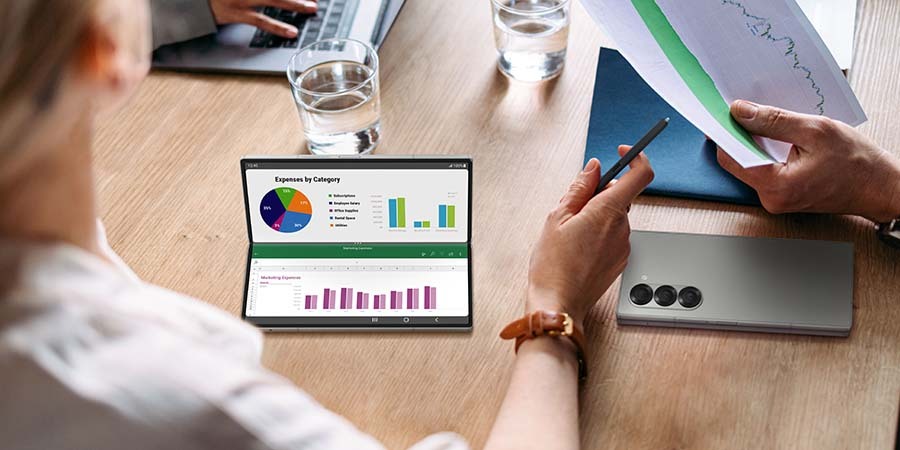Small- and medium-sized businesses (SMBs) are constantly challenged with balancing the need for innovation and effectively managing their workforce. In recent years, labor shortages, minimum wage hikes, and a shift to remote and hybrid work environments have added complexity to this dilemma. After all, small teams have always had to do more with less, but now they must also do it faster — and with fewer resources.
Mobile devices and apps can help you grow your business and empower productivity, no matter the size of your team. From line-busting to arming employees with critical information in the field, mobile devices and apps can dramatically transform and increase workforce productivity. Distributed workforces are now the new norm, which means a mobile-first approach is a game-changer in optimizing overall business operations. Still, there are right and wrong ways to deploy mobile to maximize capabilities and minimize cost, particularly on a business scale. That’s why we’ve developed this quick playbook to outline five key considerations for your business.
1. Adopt a mobile-first approach
The way we think about work has drastically evolved over the past decade. Today, getting the job done means being able to take video calls, collaborate on documents in real time, collect data, and access critical applications — and all of this needs to work equally well in remote settings. SMBs need tools that support a flexible work style to stay aligned with the demands of a remote-first future.
Mobile devices are indispensable for SMBs. Leveraged effectively, they can significantly improve and increase workforce productivity and job satisfaction. Yet, many smaller companies have not harnessed the full potential of mobile, choosing instead to adopt a fragmented Bring Your Own Device (BYOD) approach that makes it difficult to manage devices, secure company data or deploy apps consistently across their teams.
A mobile-first approach to technology deployment means investing in devices and tools that help manage and secure them. In that sense, investing in mobile device management (MDM) pays off. A robust MDM solution can ease management and deployment with frictionless out-of-the-box setup, preconfigured apps tuned to the needs of the business, and security settings that protect company data and IP. All of the leading MDM tools integrate closely with Samsung mobile devices, and we also offer an affordable cloud-based enterprise mobility management solution called Knox Manage.
Mobile-first also means establishing a partnership with a trusted technology advisor to support business growth and improve cash flows through business pricing, volume discounts, trade-in bundles and personalized delivery settings.
2. Remember that apps are king
Identifying, deploying or developing the right mobile applications that enable your teams to communicate, collaborate and track performance should be a major focus of your mobile-first strategy. Today, virtually all core desktop productivity applications have powerful mobile versions. This can start with Microsoft Office 365 and Google Workspace, but there’s more to consider. You’ll want to make it easy for employees to capture information and ideas with apps like Folia and Zoho Notebook. Messaging tools like Slack and project management tools like Wrike can keep everyone on the same page. Business management solutions like Intuit QuickBooks allow distributed teams to stay on top of everything from invoicing to payroll. Google Ads is an ideal tool for raising brand visibility among the ideal customer segment: people who are most likely to be interested in purchasing your products and services. for customers to find your business online. Collaboration and file-sharing applications are also hugely beneficial.
Your team likely already uses one or more of these apps on an “unofficial” basis. Getting everyone on the same platform (and ensuring it’s secure) can help break down barriers and boost knowledge sharing. Canvasing the team to find out what they currently use and what capabilities they need is a great starting point.
Lastly, find opportunities to innovate. Look at the existing tasks and workflows that are slowing your team down. Mobile phones can likely help.
3. Select a device that lets you do more
When you consider just how much you and your team rely on your mobile devices, it’s important to make sure you have a device that doesn’t slow you down. In today’s competitive market, 24/7 availability is a must — a single missed opportunity could make or break the business. For this reason, it makes economic sense to invest in mobile tech that maximizes your productivity.
Research from the Connected Council shows nearly half (48%) of SMBs have already deployed AI,1 and 82% say the technology has already benefitted their business. Adoption becomes even easier when you have AI built directly into mobile devices that could save time and enhance daily tasks.
Screen size matters, too. With extra screen real estate, you can master multitasking, allowing you to hold a call, search for information and then grab and send screenshots, all while still on the line. A powerful smartphone can replace many mobile workers’ PCs, eliminating the need to purchase and manage laptops or desktops that rarely get used. When you do need a desktop, you can connect your Galaxy smartphone to a monitor, keyboard and mouse through Samsung DeX.
One of the traditional challenges in buying IT equipment is knowing how much is enough. It’s not cost-effective for SMBs to manage laptops or desktops that rarely get used. Investing in Samsung devices addresses that because it means employees can enjoy the Galaxy connected experience, where their smartphones work seamlessly with their tablet, PC, Buds and Watch. They can answer phone calls on their tablet, for instance, or open mobile apps using their PC.
Choose the right phone for your growing business
Get your free guide to matching the right smartphone with your business and employee needs. Download Now
Of course, some employees have special needs, such as frontline workers who might be inspecting and repairing equipment amid inclement weather. Samsung’s lineup of rugged phones and tablets was designed to stand up to tough, real-world environments and even let employees keep gloves on while they use them.
4. Shore up security to protect your data assets as you grow
While large enterprise hacks often grab the headlines, SMBs are increasingly becoming a target for sophisticated hackers, and mobile attacks are at the heart of this growing problem. Exactly half of the respondents to Verizon’s latest Mobile Security Index2 report agreed mobile device threats are growing more quickly than other threats, and the disruption caused by the pandemic likely gave hackers new opportunities to sneak in without being noticed.
Achieving an enterprise-grade security posture doesn’t have to be overly complicated or come with an enterprise price tag anymore. Defense-grade mobile security platforms, like Samsung Knox, take the guesswork out of protecting employee phones for resource-constrained businesses where the CEO, sales or human resources person may also be IT.
5. Future-proof your business growth with SMB-friendly financing and support
While the benefits of mobility are clear, without an overarching strategy, costly missteps can derail the business. By building a plan with key productivity, availability, and security needs at the forefront, SMBs can work anywhere to ensure they can move quickly on opportunities that can fuel growth. With the help of Samsung Business Financing, you can also remain lean when cash flow is tight, enabling you to enjoy the benefits of mobile innovation without worrying about hidden fees or large upfront investments.
No matter how your business evolves, you’ll want to feel you have the support to address unexpected challenges. With that in mind, your tech partner should be able to provide you with expert advice, respond to requests for a quote, and offer assistance on orders and any other mobility needs. That way, you can focus on running your business and achieving your most ambitious goals.
Discover more ways Samsung DeX can increase workforce productivity in the office or at home. Then, explore Samsung SMB solutions designed to help grow your business and explore the benefits of Samsung Direct. If you’re not currently an Android or Galaxy user, make sure to try Galaxy for Work on your current device today.
1 https://connectedcouncil.org/new-study-finds-small-business-leaders-eager-to-add-artificial-intelligence-tools-to-their-digital-tool-kits/
2 https://www.verizon.com/business/resources/reports/mobile-security-index/









